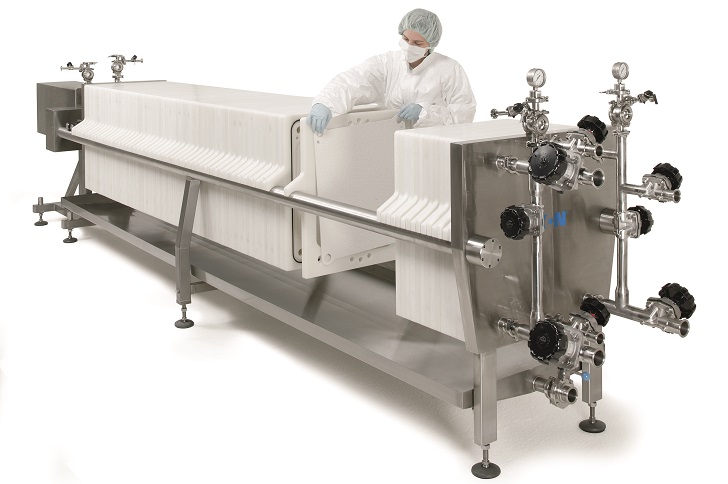
Protecting the product to be filtered is key when choosing a filtration system. Like all biopharmaceutical products, plasma fractionation has very exacting requirements. To answer these challenges, Eaton has developed the EP variant of the enclosed depth filtration system Beco Integra Plate.
Purification is a fundamental component of many fine chemical and biopharmaceutical processes. A decisive factor in choosing the filtration method is the protection of the product to be filtered. From an economic viewpoint, the efficiency of the process is another factor. Both efficient and safe, depth filtration has proven to be a reliable method to assist in purification. The depth filter medium requirements, whether a flat sheet or in the shape of the stacked disc cartridge, are equally stringent. As part of the manufacturing process as a whole, depth filtration must give rise to consistent, reproducible, and therefore, economic results.
The exacting requirements of the depth filter medium can be illustrated with plasma fractionation, because biopharmaceutical products are subject to very strict and precisely defined quality requirements and various regulatory provisions. For example, several protein fractions in the blood plasma are selectively precipitated by defining the ethanol concentration, ionic strength, temperature and pH value to extract the active agent from human plasma.
The solid and liquid fractions separated by filtration are fed into further process steps. The functions of the depth filter medium are to ensure the purity of the end product, to maintain the biological effectiveness of the active proteins it contains and, at the same time, to increase yield.
BECO INTEGRA PLATE To comply with these complex requirements, and requirements relating to the filtration system including increasing user flexibility specific to separation task and filtration volume, Eaton has developed the EP variant of the enclosed depth filtration system Beco Integra Plate. This enclosed plate and frame system is available in five sizes with vertically arranged filter plates. Depending upon the current filtration task, depth filter sheets with vast retention characteristics can be used to support efficient and effective filtration.
The Beco Integra Plate system comprises a filter chassis with hydraulic contact pressure and a filter pack. The filter pack itself consists of individual elements made of polypropylene. The depth filter sheet types from the Beco PR range, Becopad P range and the Beco PR Endura S support sheet can be used in very different ways for both sheet and cake filtration, and cake harvesting.
In addition to the extraction of the target proteins from the filtrate, precipitate harvesting, for example, plays an important role in the various stages of plasma fractionation. Depending upon the filtration task, the filter pack is made up of feed plates, filtrate plates or cake frames. For the filtration process, depth filter sheets are inserted between the filter elements and tightened. The filter elements are designed to ensure that the secure suspension of the filter sheet is easy to achieve. Thus, support bars under the filter pack are not required. The depth filter sheets can be easily removed from the bottom of the filter. The filter sheet seals the product channels of the filter elements, and no additional gaskets are required.
From small to large In addition to the 15.7 in, 23.6 in and 31.5 in sizes (400 mm, 600 mm and 800 mm), the Beco Integra Plate depth filtration system is also available in 7.9 in (200 mm) and 39.3 in (1000 mm). The additional two sizes provide even more options to scale according to your particular application in fine chemical and biopharmaceutical processes. The five sizes give users the ability to test and simulate the filtration process with the product to be filtered at a small scale under standardized conditions.
The data produced will then be used to design the required filter area on a production scale, and to select the appropriate depth filter sheet. The option of filtering on different scales also fundamentally improves flexibility for the user. One feature that results in direct economic benefits is the precise, reproducible and economical CIP capability (Clean in Place).
The CIP reliably prevents cross contamination. The special design of the overhead product channels also aids ventilation. Thanks to the optimal design and arrangement of the inlet channels, the Beco Integra Plate system provides ideal flow distribution and product feed and supports the best distribution of the unfiltered liquid thanks to a homogeneous cake structure. The unique construction of the filter elements also ensures perfect draining and filling of the filtration system. Consequently, there is no product loss and a high product yield is achieved.
The enclosed construction of the system, in combination with the automatic regulation of the hydraulic pressure, lead to maximum safety for the product and the environment. Summary By combining depth filter sheets with a wide range of retention characteristics and the Beco Integra Plate EP variant enclosed filtration system, a CIP capable system was developed to achieve consistent, reproducible and economical filtration results. The various filtration system designs in five different plate sizes support high flexibility.
The types of Beco PR and Becopad P ranges, as well as the Beco PR Endura S support sheet, enables the user to choose the appropriate depth filter sheets. The five sizes provide optimized scaling options ‘from small to large’, allowing the user first to test his filtration processes with low volumes and then to transfer this to almost any production scale. This means that the system can fulfill the exacting requirements in the field of plasma fractionation.





